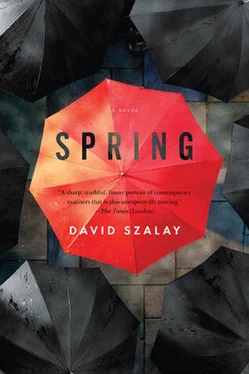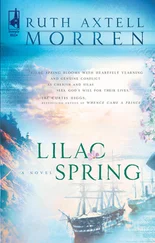He knew that Alison would be there. He knew that she would have had to account for her absence that Saturday. He expected her to have done so without involving him in the story. He expected, essentially, everything to be okay. What he did not know—though he should probably have thought of this—was that the ferrymen had not allowed Alison, who was hardly able to stand up, who was tearful and incoherent, to drive the Rolls off the ship. One of them had parked it on the quayside tarmac for her, warned her in pidgin English not to try to drive anywhere that day herself, and left her there in the whipping salt-spray. She would have phoned Anselm straight away, except for one thing. This Freddy did not know about, and had no way of knowing about. Sentimentally, unsoberly, she had left a note for her husband saying that she and Freddy were going to start a new life in another part of the world, and that she was sorry, and that she would always think of him with love, and that she thanked him for everything he had done for her, and that she was sorry, and… Please please forgive me, Alison.
She spent most of Saturday night sobbing in a hotel in Calais, and very early the next morning took a ferry to Dover and thence, at the wheel of the unwieldy Rolls, made her mascara-smudged way to London. There she had a tearful, hour-long negotiation through the intercom before Anselm finally let her into the house. Once inside, she threw herself on his mercy. Speaking through steady tears, she said that yes, something had indeed once passed between Freddy and herself. (Anselm lowered his face.) She said that Freddy was obsessed with her, that he had forced her to write that terrible note and more or less kidnapped her. How he had forced her to write the note she did not say, nor did Anselm ask. He had no interest in picking holes in her story. He sighed, very tight-throated. Then, sensing that he wanted more, she told him that Freddy was not a Russian prince or princeling or anything like that. He was just an out-of-work journalist. This Freddy had told her only a few weeks before—and he wished he hadn’t as soon as the words were out of his mouth. He had told her out of vanity, of course. Vanity. As he well knew, it was his worst weakness.
When he turned up at the house that dreary Wednesday afternoon and found the locks changed, he immediately feared the worst.
‘Yes?’ crackled Anselm’s voice, suspicious over the intercom.
‘Hi. Anselm. It’s me.’
A long, fizzing silence. ‘What do you want?’
‘What do I want?’ Freddy said with a laugh. ‘I live here, don’t I?’
‘No. You don’t.’
Something was obviously very wrong.
Finally he managed to persuade Anselm to let him into the house—he had his own hour-long negotiation through the intercom—saying that he would be able to ‘explain everything’. Though it was far from obvious to him how he would do this as, warily saying, ‘Anselm?’ he mounted the spongy stairs.
He found him in the first-floor drawing room. No lights on. A deathly atmosphere. And worryingly, he was holding an iron poker.
‘You lied to me, Fréderic,’ Anselm said.
Freddy’s intention was of course to deny everything, and the first thing he said was—‘What are you talking about?’
‘You aren’t Russian.’ The only sound was a trickle of plaster dust falling from the ceiling. ‘Your father’s a British diplomat. And his father was a policeman in Swansea.’
That was a shock. Freddy had not expected Anselm ever to find that out. There were two obvious options—deny that his father was Oliver Munt of the FO or…
‘Yes, but my mother—’
‘Your mother’s from St Albans,’ Anselm said, in a strange voice, somehow monotone and sing-song at the same time. He had evidently done his homework—there might even have been a private detective involved, for all Freddy knew—and faced with this he suddenly felt very tired, too tired to pretend. Too tired even to explain. And what was there to explain? It was all fairly obvious. ‘Who told you?’ he said. ‘Alison?’ Perhaps it was a mistake to have left her in Calais. In Calais of all places… Hell hath no fury like a woman scorned in Calais. Though she didn’t know any of the details about his parents—just that he wasn’t a Russian prince.
And then there was another shock.
‘I know that you… you once slept with her,’ Anselm said, hanging his head and looking at the floor. He made a strange little expectorant noise. ‘She told me.’
Now this was very strange. Why on earth had she done that ? It just didn’t make sense.
‘I thought you were my friend, Fréderic.’
For a long time Freddy just stood there. Then he shrugged. ‘I don’t know what to say,’ he said.
‘Please just leave.’
‘Anselm…’
The poker twitched.
‘My things?’
Still staring at the floor, Anselm nodded.
Freddy went upstairs and put his things into the khaki haversack. They fitted quite easily—he had few possessions. He wondered whether to try to speak to Alison on his way out; he was puzzled as to why she had told Anselm everything. There must be something he didn’t know about. Some factor he wasn’t taking into account.
He descended the stairs, with their steep mahogany handrail; the series of landings whose scurfy sash windows were filled with mature trees.
On his way out, he looked into the first-floor drawing room. Anselm was nowhere to be seen. The whole house, in fact, was eerily silent.
Outside in the twilight he shifted the haversack onto his shoulder and walked to the tube station. He had just enough money for the ticket to Russell Square.
*
While Freddy, haversack on shoulder, was taking his place in the ululating lift at Russell Square station, James was sprawled unsuspectingly on the sofa in Mecklenburgh Street wondering whether to nip out to the Four Vintners on Gray’s Inn Road for a half-litre of Jack Daniel’s or dark rum. Sitting forward, he stared for a few more seconds at the TV. All-weather racing from Wolverhampton, seedily floodlit. Encased in puffa jackets, the pundits held their microphones in numb hands, exhaling mist into the frore Midlands night. Without switching them off—merely silencing them—he jacketed and scarfed himself, leashed Hugo and went out into the street upstairs.
In spite of the many messages he had left since Sunday, he had still heard nothing from Katherine—a silence that seemed increasingly meaningful—and he was miserable. He had spent the day drifting through London like a wind-blown plastic bag. He had a solitary lunch at one of the Bangladeshi places on Brick Lane—one of the unpretentious ones up near the Bethnal Green Road end. Plastic cups, Formica table-tops. The sound of traffic from the door. When he had eaten, he wandered up to Victoria Park—vacant in the spring sunshine—and from there walked along the towpath. He passed the flat where he had once lived, on the other side of the black, sun-struck water. It was strange to see it now, someone else’s home. There was some unfamiliar outdoor furniture on the terrace—and how strong, as he stood there, was the sense of being shut out of the past! The sense of the evanescence of things, experience, time—no solider than the jellying light on the undersides of the bridges. The sense of time slipping very slowly away.
From the start, it seemed to him now, he had not felt enough. At the important moments, there was just an insufficiency of feeling. When she told him that Fraser had been in touch with her. When she told him, two weeks later, that she wanted to see Fraser. And when she said to him, in the half-light the next morning, ‘What do you think I should do?’ It was not that he thought he had failed, on those occasions and others, to express what he felt. He had just not seemed to feel enough when feeling was most needed. It troubled him, this sense that it was a failure of feeling, and not a failure of expression. A man unable to express his feelings. That was magazine normality, nothing to worry about. A man unable to feel his feelings. Well, that did sound worse.
Читать дальше












